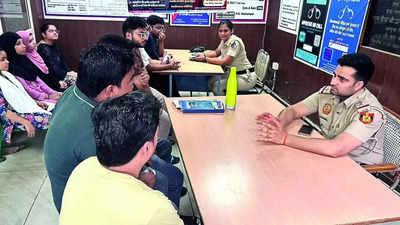- News
- City News
- delhi News
- New criminal laws: How Delhi cops responded to first day of calls
Trending
New criminal laws: How Delhi cops responded to first day of calls
During a shooting call, a cop efficiently used the police app for real-time recording. He emphasized the importance of internet connectivity for uploading details within 48 hours.

On receiving the call, the 27-year-old cop entered a brief description and noted the Daily Diary Entry in E-Praman, the police app.He then reached the location and recorded a video using the app, geo-tagged the spot and provided a brief description in one of the columns. The video was subsequently uploaded to the centralised video pool at Police Headquarters. Following this, the policeman recorded the seizure memo and uploaded it. Upon completing the final upload, a certificate under Section 63(4) of Bharatiya Nyaya Sanhita, the replacement of the Indian Penal Code, was generated. The entire process took a few hours.
"There was a mix of excitement and a little nervousness,” the policeman told TOI. “At the crime spot, the first thing I did was record or photograph the scene. This was the first time I was doing so. Every single frame t required for investigation was recorded and then uploaded on the app, all in real time."
It was also the first time that the investigator didn't use a pen and paper at the crime spot. "My mobile phone was my main tool and every single thing was videographed in sequence,” he said. “I won't need to sift through a thick bunch of papers to check any point during investigation. Everything is stored in the app, which cannot be tampered with or misplaced." He also said that in case there was no internet connectivity, the investigating officers were given 48 hours to upload the details once they re-entered internet areas.
He added, “Even after many years, if I just key in the FIR number, I will get all the details of the case. The accused cannot now claim that the evidence was planted or tampered with and it will also be legally acceptable." A video of a length of 15 minutes can be uploaded at a time.
TOI accompanied another investigating officer to a theft call. The cop explained to the victim the new laws and the procedure they were to adopt. The scene was videographed and the complainant was informed about the process that had been set into being and the BNS section under which his case would be registered. The cop had thoughtfully carried a handbook on the new laws to confirm the sections being invoked.
After the recording of the crime site was completed, the crime and forensics teams were called to the spot. It was the first day of the new laws but the procedures didn’t prove hectic or smooth. “It's only the first day. We'll slowly get used to the new system," the investigator said, adding that within a few minutes, the entire details had been uploaded on the app for senior officers to check. In the earlier system, there was a lot of time-consuming paperwork required.
End of Article
FOLLOW US ON SOCIAL MEDIA










